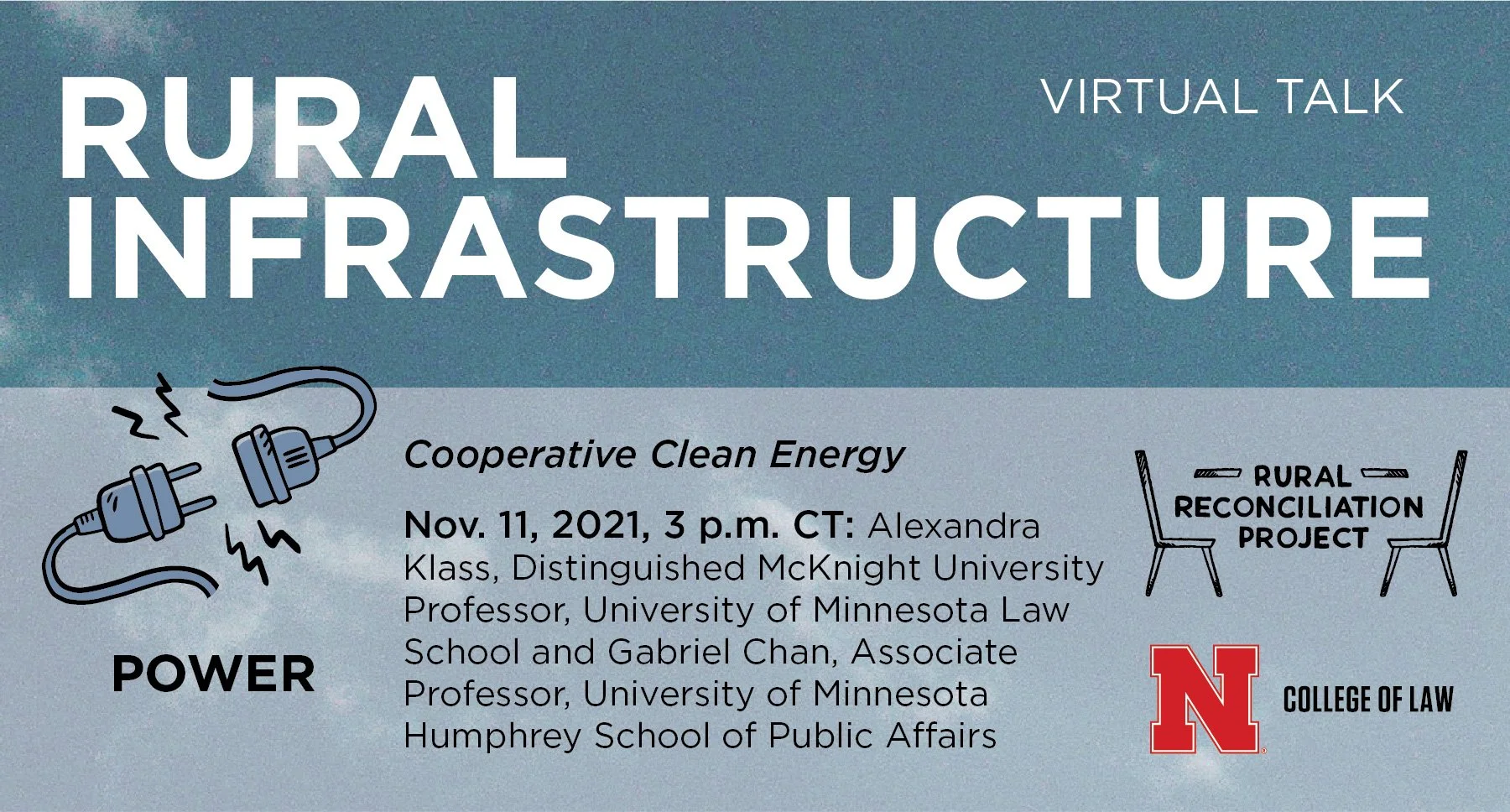Event Summary: Alex Klass & Gabe Chan on Rural Power (11.11.21)
Professors Alexandra Klass and Gabe Chan presented the second talk in our 2021 - 2022 Rural Reconciliation Project program series on RURAL INFRASTRUCTURE on November 11, focusing on the theme of POWER. A full recording of their talk, Cooperative Clean Energy, is available here.
On this page, Karsen Sims, a wonderful second-year law student at the University of Nebraska College of Law and esteemed Project research assistant (find her bio in the student contributor section here), provides the following event summary, from her perspective.
On Thursday, November 11, 2021 Alexandra Klass (Minnesota Law) and Gabe Chan (Minnesota Public Affairs) spoke for the Rural Reconciliation Project’s Rural Infrastructure Research Series on the topic of POWER. Klass and Chan’s discussion built on their forthcoming article Cooperative Clean Energy (digested by RRP here). Overall, the talk explored the important, unique, and under-studied role of electric cooperatives, particularly rural electric cooperatives, in the U.S. energy system and the green energy transition more specifically.
Klass and Chan divided the lecture with Chan presenting the historical background of electric cooperatives in the United States and how the modern governance of these cooperatives affects their position in the energy transition. Klass followed this discussion by a presentation of three case studies highligting different strategies cooperatives are using across the country to shift toward greener energy landscapes. The authors ended the lecture with a set of recommendations for citizens and electric cooperatives.
To start, Dr. Chan explored how many U.S. electric cooperatives have their roots in New Deal initiatives, particularly the Rural Electrification Act. Today, there are over 800 electric cooperatives that serve over 14% of the U.S. population in 48 of the 50 states. Electric cooperatives are non-profit entities that are lightly regulated and self-governed by elected boards. Today, cooperatives operate through a multi-level structure: At the top, Generation and Transmission Cooperatives (G&Ts) provide the majority of infrastructure and serve individual cooperatives, who are in turn run by the local elected board. As a result of this self-governed structure, electric cooperatives are subject to much less regulation compared to private investor-owned electric companies. This unique positioning provides the cooperatives with the power to pursue different pathways to transition to clean energy, mediated by internal and external pressure to different extents.
Professor Klass then highlighted three case studies, which explored three distinct mechanisms cooperatives are using to engage in the transition to clean energy in different areas of the U.S. First, the “Change Through Exit” approach focused on cooperatives exiting long term contracts as a reaction to disputes over price, a desire to self-generate more electricity, and to pursue a more expedited transition from coal to renewables. Second, the “Change Through Renegotiation” approach focused on renegotiating more autonomy for distribution cooperatives to self-supply, mostly by solar and wind. Finally, the “Change Through Grassroots Advocacy” approach explored how some local cooperatives—including in particular cooperatives in the Southeast run by minority communities—were pushing against historically white, male utility leadership and working to combine clean energy transition efforts with energy democracy and racial justice goals.
Based on findings from these case studies, Klass and Chan left the audience with four recommendations for the cooperative clean energy transition: (1) integrating cooperatives in wholesale markets, (2) rethinking cost allocation for clean energy investments, (3) rethinking cost allocation for retirement of fossil assets, and (4) bolstering internal governance systems to better represent all members.
In sum, this seminar provided the audience with insight on how electric cooperatives can have a unique role in the energy transition, particularly building off their “cooperative principles” and strengthened multi-level governance. Remarks and questions from the audience ranged from understanding how important federal investment is, a discussion of current proporposed legislation, correlations between the strength of communities and electric investments, and how to get cooperative members more involved and knowledgeable concerning cooperative activism.
***
There is much more to talk about in terms of rural infrastructure, and we look forward to continuing this conversation in the new year. Our next seminar will feature Professor Gregory Shill from the University of Iowa School of Law on rural transportation infrastructure. Register here.
